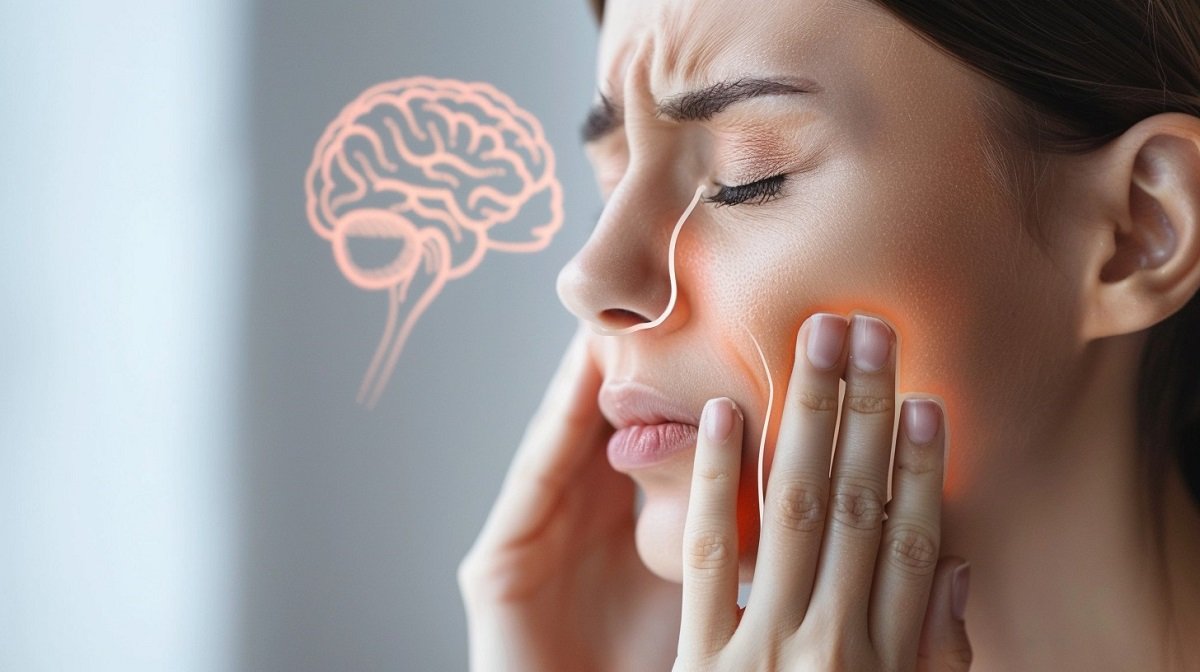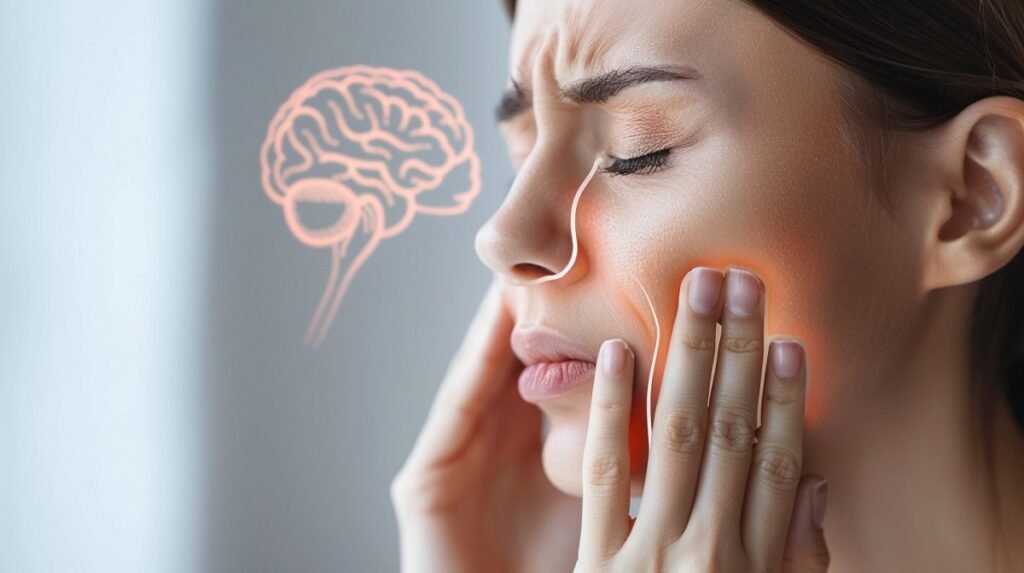Nasal congestion and colds are frequently accompanied by sinus pressure and vertigo. Sinus pressure and dizziness without congestion have to discuss today. Still, a fascinating minority of people have these symptoms without the usual nasal obstruction. Questions concerning the complex relationship between sinus pressure and dizziness as well as the underlying causes are raised by this phenomenon. In order to shed light on this confusing medical condition, this essay will investigate the different factors that contribute to sinus pressure and dizziness when there isn’t any congestion.

A common ailment that many people encounter at some point in their lives is sinus pressure. It is frequently linked to sinusitis, a disorder in which inflammation of the sinuses causes pressure and discomfort in the face. We will examine sinus pressure causes, symptoms, and practical solutions in this post.
Understanding Sinus Pressure
The sinuses are air-filled cavities in the skull, and sinus pressure is usually associated with inflammation within the sinuses. Pressure builds up in these areas when they are obstructed or crowded, which can cause discomfort and even dizziness. On the other hand, additional factors need to be taken into account when nasal congestion is absent.
Potential Causes Sinus Pressure And Dizziness Without Congestion
The air-filled cavities that surround the eyes and nose are called sinuses. The sphenoid, maxillary, frontal, and ethmoid sinuses are the four pairs of sinuses. The mucous membrane lining these sinuses secretes mucus, which moistens the nasal passages and collects dust and bacteria. An accumulation of mucus and elevated pressure may result from sinus inflammation.
1. Allergies:
Allergy-induced sinus inflammation can occur independently of congestion. For those who are vulnerable, environmental allergens like dust, pollen, or pet dander can cause sinus pressure and vertigo.
2. Vasomotor Rhinitis:
A non-allergic ailment called vasomotor rhinitis is typified by nasal passage blood vessel dysfunction. Even in the absence of congestion, this can cause sinus pressure and vertigo.
3. Migraines:
Dizziness and sinus pressure are two of the many symptoms that are known to be brought on by migraines. Although the exact mechanisms are unknown, vasodilation and variations in blood flow might be important.
4. Sinusitis without Congestion:
An inflammation of the sinuses known as chronic sinusitis can happen even when there isn’t much congestion. Dizziness and sinus pressure may be the most noticeable symptoms in such cases.
5. Barometric Pressure Changes:
Variations in weather can cause sinus pressure and dizziness in people who are sensitive to changes in atmospheric pressure. People who have previously experienced sinus problems may find this to be particularly common.
6. Sinusitis:
Acute Sinusitis frequently brought on by a bacterial or viral infection, which causes sinus symptoms to appear suddenly. Chronic Sinusitis: Chronic sinusitis, which lasts longer than 12 weeks, can be brought on by nasal polyps, recurrent infections, or other underlying conditions.
7. Allergies:
Pollen, dust, and pet dander are examples of environmental allergens that can cause an allergic reaction that irritates the sinuses.
8. Nasal Polyps:
Sinus pressure can be brought on by noncancerous growths in the sinuses or nasal passages that impede the passage of mucus and air.
9. Deviated Septum:
An uneven wall between the nostrils, known as a deviated septum, can prevent the sinuses from draining normally, causing pressure and discomfort.
10. Respiratory Infections:
Inflammation of the sinuses and nasal passages can be brought on by colds, the flu, and other respiratory infections, which raises blood pressure.
Symptoms Management
1. Medical Intervention:
A medical professional’s advice is necessary to arrive at a precise diagnosis. The underlying cause may determine the prescription of drugs like corticosteroids, decongestants, or antihistamines.
2. Allergen Avoidance:
If allergies are found to be the cause, symptoms can be managed by removing allergens from the environment and avoiding triggers.
3. Lifestyle Modifications:
A healthy lifestyle that incorporates stress reduction, consistent exercise, and adequate hydration can improve general wellbeing and potentially reduce symptoms.
4. Migraine Management:
Migraine sufferers may lessen the frequency and severity of their attacks by recognizing their triggers and making lifestyle changes. It is also possible to prescribe migraine-specific medications.
Relief and Treatment
Treatment for sinus congestion involves a variety of techniques designed to reduce the discomfort that comes with inflamed nasal passages. Over-the-counter decongestant nasal sprays, like oxymetazoline, can offer quick relief by narrowing blood vessels in the nasal tissues, which reduces swelling and facilitates easier breathing. Saline nasal irrigation, which involves using a saline solution or a nasal saline spray, helps flush out mucus and irritants from the nasal passages, providing a natural and non-medicated option. Moreover, steam inhalation, which involves breathing warm, moist air, can help relieve nasal congestion by moisturizing the nasal passages and facilitating mucus drainage.
Dizziness Relief & Vertigo Medicine w/Peppermint
1. Nasal Irrigation:
Rinsing the nasal passages with a saline solution aids in mucus clearance and inflammation reduction.
2. Steam Inhalation:
Steam inhalation can ease sinus pressure and relax nasal passages.
3. Decongestants:
Reducing nasal congestion is one way that over-the-counter decongestant medications can offer temporary relief.
4. Pain Relievers:
Acetaminophen or ibuprofen are examples of over-the-counter pain relievers that can help with sinus headache and facial pain.
5. Allergy Management:
Allergic reactions resulting in sinus pressure can be avoided by recognizing and avoiding allergens.
6. Prescription Medications:
A medical practitioner might suggest prescription drugs if the patient has severe symptoms or chronic sinusitis.
When to Seek Medical Attention?
Seeking medical attention is advised if sinus pressure lasts for a long time, is accompanied by excruciating headaches, or if over-the-counter medications are ineffective. They are able to identify the underlying reason of the sinus pressure and suggest a course of action.
Conclusion
In summary, sinus pressure and non-congestional dizziness constitute a challenging medical puzzle with numerous possible explanations. For an accurate diagnosis and successful treatment, it is essential to comprehend how various conditions like allergies, vasomotor rhinitis, migraines, and sinusitis interact. Seeking expert medical guidance and embracing a holistic approach to wellbeing can enable people to effectively navigate and surmount the obstacles presented by this puzzling health condition. More understanding of the mechanisms underlying sinus pressure and dizziness without congestion may become available as medical research progresses, opening the door to more specialized and individualized treatments.
One prevalent and frequently treatable condition is sinus pressure. By identifying the underlying causes, identifying the symptoms, and using practical relief techniques, people can reduce discomfort and enhance their quality of life in general. For an accurate diagnosis and course of treatment, it is imperative to consult a physician if sinus pressure becomes chronic or substantially interferes with daily activities.


